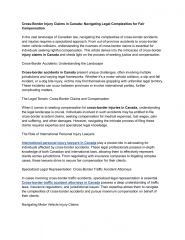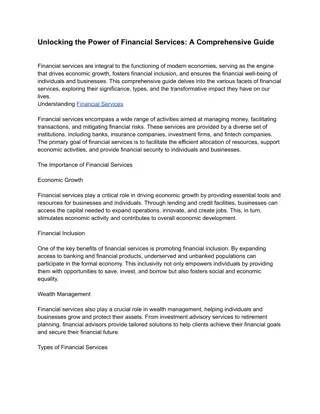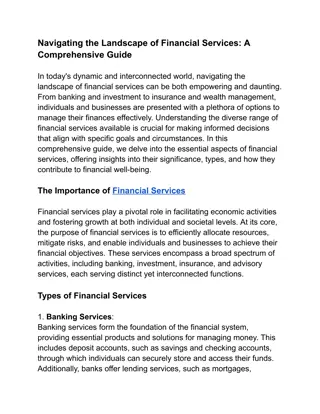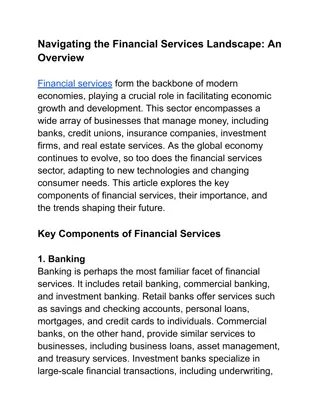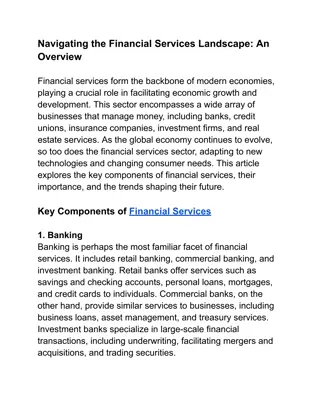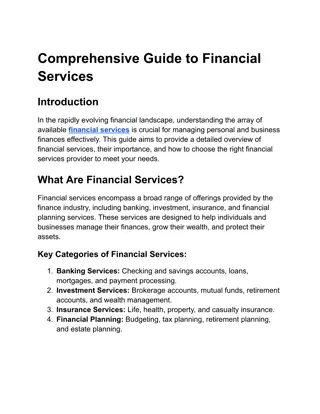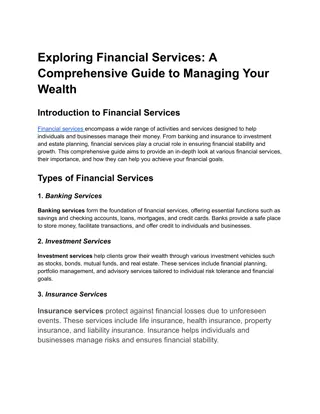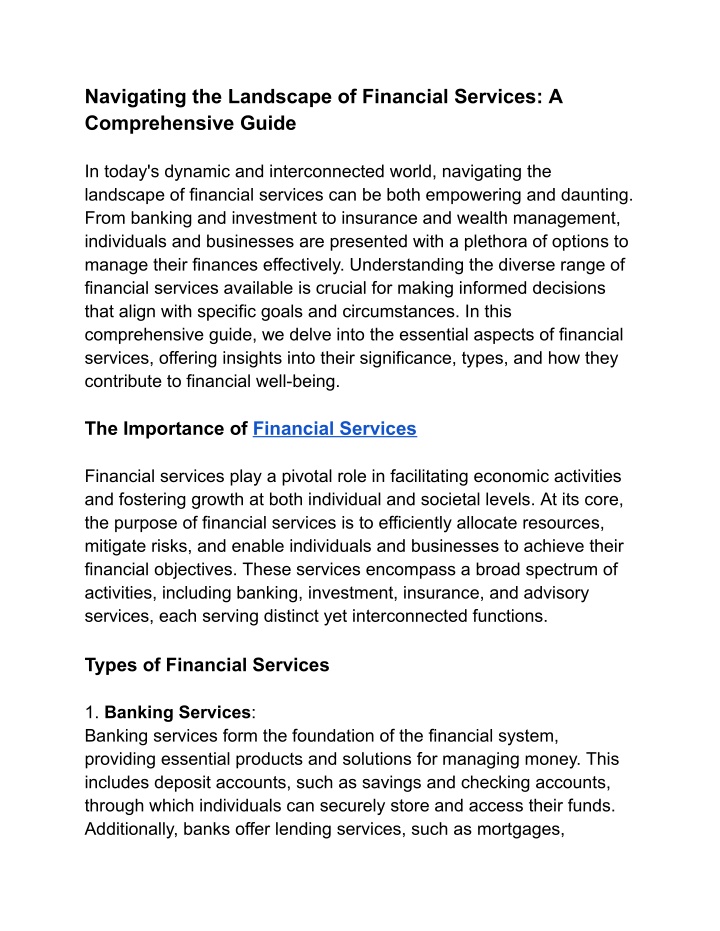
Navigating the Landscape of Financial Services_ A Comprehensive Guide
In today's dynamic and interconnected world, navigating the landscape of financial services can be both empowering and daunting. From banking and investment to insurance and wealth management, individuals and businesses are presented with a plethora of options to manage their finances effectively. Understanding the diverse range of financial services available is crucial for making informed decisions that align with specific goals and circumstances. In this comprehensive guide, we delve into the essential aspects of financial services, offering insights into their significance, types, and how
Uploaded on | 1 Views
Download Presentation

Please find below an Image/Link to download the presentation.
The content on the website is provided AS IS for your information and personal use only. It may not be sold, licensed, or shared on other websites without obtaining consent from the author. If you encounter any issues during the download, it is possible that the publisher has removed the file from their server.
You are allowed to download the files provided on this website for personal or commercial use, subject to the condition that they are used lawfully. All files are the property of their respective owners.
The content on the website is provided AS IS for your information and personal use only. It may not be sold, licensed, or shared on other websites without obtaining consent from the author.
E N D
Presentation Transcript
Navigating the Landscape of Financial Services: A Comprehensive Guide In today's dynamic and interconnected world, navigating the landscape of financial services can be both empowering and daunting. From banking and investment to insurance and wealth management, individuals and businesses are presented with a plethora of options to manage their finances effectively. Understanding the diverse range of financial services available is crucial for making informed decisions that align with specific goals and circumstances. In this comprehensive guide, we delve into the essential aspects of financial services, offering insights into their significance, types, and how they contribute to financial well-being. The Importance of Financial Services Financial services play a pivotal role in facilitating economic activities and fostering growth at both individual and societal levels. At its core, the purpose of financial services is to efficiently allocate resources, mitigate risks, and enable individuals and businesses to achieve their financial objectives. These services encompass a broad spectrum of activities, including banking, investment, insurance, and advisory services, each serving distinct yet interconnected functions. Types of Financial Services 1. Banking Services: Banking services form the foundation of the financial system, providing essential products and solutions for managing money. This includes deposit accounts, such as savings and checking accounts, through which individuals can securely store and access their funds. Additionally, banks offer lending services, such as mortgages,
personal loans, and business loans, to facilitate capital formation and investment. 2. Investment Services: Investment services cater to individuals and institutions seeking to grow their wealth over time. These services encompass various investment vehicles, including stocks, bonds, mutual funds, and exchange-traded funds (ETFs). Investment advisors and asset managers assist clients in developing personalized investment strategies tailored to their risk tolerance, time horizon, and financial goals. 3. Insurance Services: Insurance services provide protection against unforeseen risks and uncertainties, offering financial security in the face of adversity. This includes life insurance, health insurance, property insurance, and liability insurance, among others. By transferring risk from individuals to insurance companies, policyholders gain peace of mind knowing that they are safeguarded against potential losses. 4. Wealth Management Services: Wealth management services cater to high-net-worth individuals and families seeking comprehensive financial solutions. These services encompass investment management, tax planning, estate planning, retirement planning, and philanthropic advisory, tailored to the unique needs and objectives of affluent clients. Wealth managers collaborate closely with clients to optimize their financial resources and preserve generational wealth. 5. Financial Advisory Services:
Financial advisory services provide expert guidance and recommendations on various financial matters, empowering individuals to make informed decisions. This includes retirement planning, college funding, debt management, and budgeting assistance. Financial advisors leverage their expertise and insights to help clients navigate complex financial situations and achieve long-term financial security. Navigating the Financial Services Landscape With a myriad of financial services available, navigating the landscape can seem overwhelming. However, by following a systematic approach, individuals and businesses can make informed decisions that align with their financial objectives. Here are some key steps to effectively navigate the financial services landscape: 1. Assess Financial Needs: Start by assessing your financial needs, goals, and risk tolerance. Consider factors such as income, expenses, assets, liabilities, and future obligations to gain a holistic understanding of your financial situation. 2. Research Service Providers: Conduct thorough research on different service providers, including banks, investment firms, insurance companies, and advisory firms. Evaluate their reputation, track record, fees, services offered, and client reviews to identify the most suitable partners. 3. Seek Professional Advice: Don't hesitate to seek professional advice from qualified financial advisors, planners, and consultants. These experts can offer
personalized recommendations and guidance tailored to your specific circumstances and goals. 4. Diversify Investments: Diversification is key to mitigating risk and maximizing returns. Spread your investments across different asset classes, sectors, and geographic regions to minimize exposure to market fluctuations and unforeseen events. 5. Review Regularly: Continuously monitor and review your financial plan to ensure it remains aligned with your evolving goals and objectives. Make adjustments as needed based on changes in your financial situation, market conditions, and regulatory environment. Conclusion In conclusion, financial services play a critical role in empowering individuals and businesses to achieve their financial goals and objectives. By understanding the diverse range of financial services available and navigating the landscape effectively, individuals can make informed decisions that lead to long-term financial security and prosperity. Whether it's banking, investment, insurance, wealth management, or advisory services, choosing the right partners and strategies is essential for financial well-being in today's complex world.

